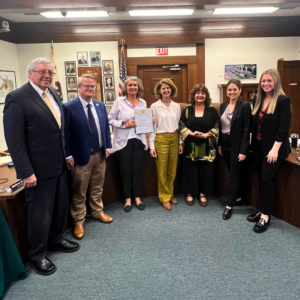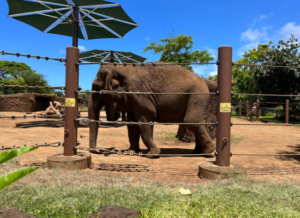I’m writing today to reflect on the present moment and provide updates on some of the incredible work happening at the Nonhuman Rights Project right now.
The NhRP remains steadfast in our mission to change the world for nonhuman animals as we continue to adjust to the loss of our founder, Steve. Steve was an extraordinary combination of visionary and executive: he saw something deeply wrong in the world and dedicated his life to doing something about it, including building the NhRP. Under Steve’s leadership, we took the cause of nonhuman rights from one that nobody was even thinking about to one that sparked a global discussion about the need to change animals’ legal status from things with no rights to persons with fundamental rights. We’ve had historic animal rights hearings. We’ve persuaded two justices on New York’s highest court to speak out for Happy the elephant in powerful dissents that will support the movement for decades to come. We’ve developed and helped pass the first animal rights law in the US.

As our cause gains traction we’re also seeing an increase in opposition. Our opponents are so rattled by our swelling support that they’re now trying to enact unconstitutional anti-rights legislation–Utah’s HB 249–that would prevent any facet of state government from ever recognizing any legal rights for nonhuman animals and other nonhuman entities. Under that bill, a judge who determines that the best legal ruling in a case involves recognizing a legal right for a nonhuman animal would be prohibited from making such a ruling–a violation of judicial independence which is at the foundation of our legal system.
What are we doing to meet this moment?
One of Steve’s greatest accomplishments was bringing together my colleagues at the NhRP and passionate supporters like you to build on this momentum. And I’m confident historians will one day look back at today as a time where we did just that.
Presently, we’re litigating three different petitions that are on or headed toward appeal. Appellate litigation is a labor-intensive affair involving exhaustive research, discussion, writing, editing, and preparation. It also involves networking with potential stakeholders and allies who can help by submitting amicus briefs, providing local insight, or broadcasting our message to the community. This degree of diligence is especially important for litigation such as ours that raises important and novel questions of law. Appellate decisions often become precedential. We bear a high burden of persuading these courts that business as usual is unjust, and so we must do everything we can to perfect our presentation of argument in order to maximize the prospect of a favorable outcome for our clients.
In Colorado, the NhRP’s case on behalf of Jambo, Kimba, LouLou, Lucky, and Missy–five female African elephants confined at the Cheyenne Mountain Zoo–is now heading to the Colorado Supreme Court. After extensive briefing and consideration, District Court Judge Eric Bentley granted the Cheyenne Mountain Zoo’s motion to dismiss the case. Judge Bentley assumed that “[e]lephants are autonomous and extraordinarily cognitively complex and social beings” who “cannot function normally in captivity[.]” He nonetheless found that nonhuman animals have no right to habeas relief “no matter how cognitively, psychologically, or socially sophisticated they may be.” In so doing, he honestly acknowledged the “reality” of a double standard “based on nothing more than biological prejudice.”
This reasoning embraces injustice. One being who possesses extraordinary cognitive capacities such as autonomy, empathy, self-awareness, theory of mind, and long-term memory can be kept in captivity where they cannot function normally. Meanwhile, another being with similar cognitive capacities (rightly) enjoys a right to bodily liberty. The key difference between the two is a fork in their biological ancestry: one is an elephant while the other is a human. It’s precisely the role of the common law–the basis of the elephants’ case in Colorado–to “avoid injustice” through judicial decisions.
In Colorado, writs of habeas corpus skip the intermediate court of appeals and go straight to the Colorado Supreme Court–Colorado’s highest court. That is where Jambo, Kimba, LouLou, Lucky, and Missy’s case is now pending as we draft their opening brief explaining why the Colorado Supreme Court must exercise its authority to remedy the injustice of their confinement.
In Michigan, we developed a case last year that we hoped to file on behalf of Tommy–the NhRP’s first client–against the DeYoung Family Zoo which was keeping him imprisoned. Tragically, we learned through our investigation that Tommy was reportedly found dead in February of 2022, “curled up in his sleeping spot” inside a building on the DeYoung Family Zoo property. We proceeded with the case in Tommy’s memory, petitioning for writs of habeas corpus on behalf of Louie and six other chimpanzees also imprisoned at the zoo. Judge Mary Barglind of the 41st Circuit Court denied the petition on the basis that chimpanzees are not persons, which is wrong. The court’s reflexive adherence to business as usual is disappointing but not surprising. We’re fighting against a deeply ingrained injustice. And our case against this injustice presents a novel question of law in the state that Judge Barglind may have thought ought to be answered by the appellate courts anyway.

In Hawaii, O’ahu First Circuit Court Judge Gary W.B. Chang indicated at the end of a 45-minute hearing that he would dismiss our habeas petition on behalf of Mari and Vaigai–two Asian elephants held captive at the Honolulu Zoo. Judge Chang’s earnest consideration of our case provides a silver lining to the dismissal. A 45-minute hearing may not seem significant at first blush but trial court (non-appellate court) judges regularly allot only a few minutes to hearing motions. Oftentimes they rule without holding a hearing at all, as we experienced in the Michigan case. Judge Chang not only gave us time but prepared for the hearing and asked thoughtful, probing questions. We are still awaiting a final judgment so we can officially take Mari and Vaigai’s case to the Intermediate Court of Appeals.
It’s of course disappointing when a judge rules against us but I’m heartened to see the arc of justice bending our way. One of my favorite metaphors from Steve was that of a four-thousand-year-old legal wall separating humans from all nonhuman animals, with human “persons” enjoying the privilege of elevating even their most trivial interests above the most fundamental interests of the animal “things.” If a single nudge of a single stone of this wall were enough to topple it, then it would’ve already been done by now. And that’s why we keep pushing.
These three cases are just our active litigation but there’s so much more we’re working on right now to advance our mission to secure legal rights for nonhuman animals. Several years ago, we expanded our work to include legislation. In 2023, we worked closely with a dedicated NhRP supporter who’d become a city council member in Ojai, California, to pass the first ordinance in the US to recognize the legal right of a nonhuman animal–elephants’ right to liberty. Right now we’re working with legislators around the country to enact more groundbreaking legislation recognizing legal rights for animals in other jurisdictions. Building on the huge shows of support for Happy’s case, including by judges, we also helped develop and are working to pass the first elephant captivity ban in the US to free Happy and Patty from the Bronx Zoo (stay tuned for further updates). Meanwhile, we’re rapidly building out the education component of our Free to be Elephants campaign, which aims to end elephant captivity in US zoos once and for all.
We’re also developing our next animal rights case, developing a strategic response to anti-rights legislation, building support for our legislative agenda, engaging in strategic planning, and, as always, talking about our work with as many people in as many ways as we can to inject as much energy into this movement as is possible.
The thick wall holding nonhuman animals captive to legal thinghood must be dismantled. Only through recognition of legal rights can a semblance of justice between human and nonhuman animals be achieved. But undoing millennia of institutionalized injustice is not easy and it will not happen overnight–we must be smart, flexible, and persistent. Our advocacy on behalf of our clients is and will remain exactly that.